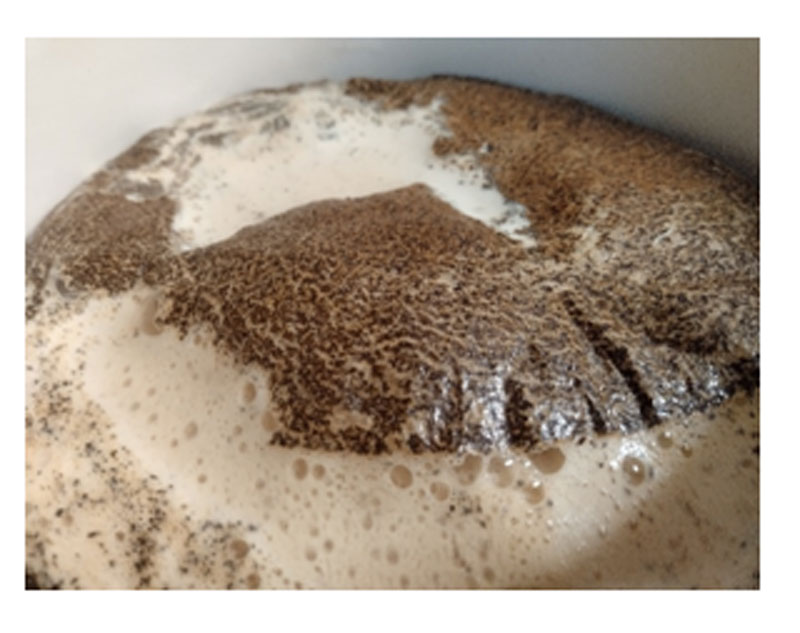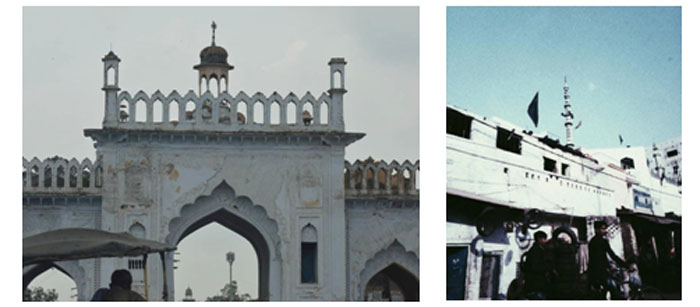
My new housemate is from Kerala, India. He moved to the UK for a master’s degree in management. He is a Manchester United fan, he likes dancing, and he makes great tea. He jokes about how disappointed he was with the tea when he first arrived in the UK. “The land of tea,” he says, making speech marks in the air and shaking his head. He brings tea over from India, in large plastic bags which he stores in his room. We have developed a daily ritual where he knocks on my door in the afternoon when it is time for a cup of tea. He makes it by boiling two cups of milk, mixed with some water, and two spoonsful of tea. As it boils, the surface layer of the tea rises like a mushroom and then collapses on itself. He blows it down to keep it from overflowing until it is brewed enough. When the mushroom collapses, the tea is ready.
In the courtyard, he tells me about the different types of tea in India. We don’t have much in common, but there is always something to laugh about. He works at McDonalds and is currently applying for jobs in the corporate world. I have just started a master’s degree in poetry at the University of York and I work part-time in a pancake house. His dream is to find a good job and settle in the UK. My dream is to be a writer. Over the last month, we have become close friends. Now I always look forward to that knock on my door in the afternoon.
For a long time, I have wanted to go to India. After the partition of India and Pakistan in 1947, my family left India to escape the violence that ensued. They went to Kenya, where my father was born. When the UK opened its borders to the former colonies because they needed workers after the Second World War, my grandparents decided to resettle again in Derbyshire. This time for good. I only have vague memories of them, because they passed away when I was young, but I remember drinking tea in the house where my father grew up. My aunties used to make it in the pan like my flatmate does now, but they would add spices as well. We sat on the floor in the living room because there was not enough space on the sofas and no dining table.
The front of the house used to be a shop, but that has long since closed. Growing up there, my father always wanted to escape the claustrophobic environment. He went to London for university and met my mother, a Portuguese student on one of the first Erasmus programs. Portugal joined the EU in 1986, when my mother was starting university, so it was through a convergence of historical forces that both were sitting in the library one afternoon on a table opposite from each other. A few years later, they got married.
When I was two, my mother was offered a job in Belgium. They moved together and for a few years we lived in a nice house with a big garden in a Flemish suburb. My father moved out after they got divorced, so I lived with my mother for most of the week and saw my father on Thursdays and Fridays. I would spend the school holidays in Portugal, with my Portuguese grandparents. Occasionally, my father and I would drive to the UK and spend time with my cousins and aunties. Due to these circumstances, I grew distant from my Indian heritage. In fact, I was embarrassed by it, because the Indians in my school were bullied. It always felt like a secret I was trying to conceal – if anyone asked, I was Portuguese.
It was only later that I began to appreciate the richness of Indian culture and embrace my heritage. On my year abroad in the US, I did an ‘Introduction to South Asia’ module, which helped me to understand a bit more about the history of that part of the world, and why my family had to leave. I was starting to become more curious about my own family history, and the peculiar circumstances that led to my own cultural mix. The term ‘third culture’ has been used to describe the mixed identity a child assumes when they are influenced by both their parents’ cultures and the culture in which they were raised, but having gone to an international school in Belgium, with English speaking parents who are not from England, the term doesn’t seem adequate enough to describe the blend of cultural influences in my childhood. To make matters even more confusing, after my parents got divorced, I had a live-in nanny from Ecuador who only spoke Spanish.
As a result of all this, I have always felt a kind of spiritual longing to return to some lost homeland of my ancestors – a place where I belong. Of course, this homeland is imaginary, because there isn’t anywhere in the world where I am not a foreigner in some sense of the word. I do not think there is a word for the feeling in English, a kind of nostalgia for a place that doesn’t exist. Going to India has been a dream of mine for many years, to finally reconnect with the land of my ancestors, but I know that I would be as much a foreigner in India as any tourist would. The languages and customs are foreign to me. Even the weather is foreign, because I have spent most of my life in this drizzly grey northern hemisphere.

Photos of Lucknow, India by Agrima Singh Parihar
The image of India that I have is pieced together from the second-hand fragments that I have gathered over the years: books, movies, photographs, music, food, tea, etc. I feel closer to India in a cultural sense than I ever have before, but geographically far away. If I went to India, I wonder if that would reverse? I have spent so long building up an image of India in my head and I am not sure if I am ready for this image to be shattered – what then would I have left to stand on, to long for?
But I have recently come to an important realisation. It is not India that I long for: it is a deeper sense of spiritual communion between myself and the world around me. That, I believe, is a common feeling to many people in the twenty-first century – not just third culture kids. In the absence of a shared mythology, we live in a fragmentary world. We do not have an underlying structure of beliefs to provide meaning to our lives, so we are all spiritually exiled in some sense or other. We must find other ways to create our own meaningful experiences with the people around us. Otherwise, life is empty.
I believe the answer lies within our interpersonal relationships. It is through genuine human connection that we can feel a sense of communion again. We should cultivate our relationships with care, because it is only through these relationships that we can come to a better understanding of who we are and bridge the gap between ourselves and the world. This would lead us on a path of self-realization, which I believe is the highest level of spiritual attainment. My imaginary homeland, I have a realised, is not a place on the map – it is a condition of the heart.
Gilles Madan
More photos by Agrima on Instagram at @agrimasinghh
